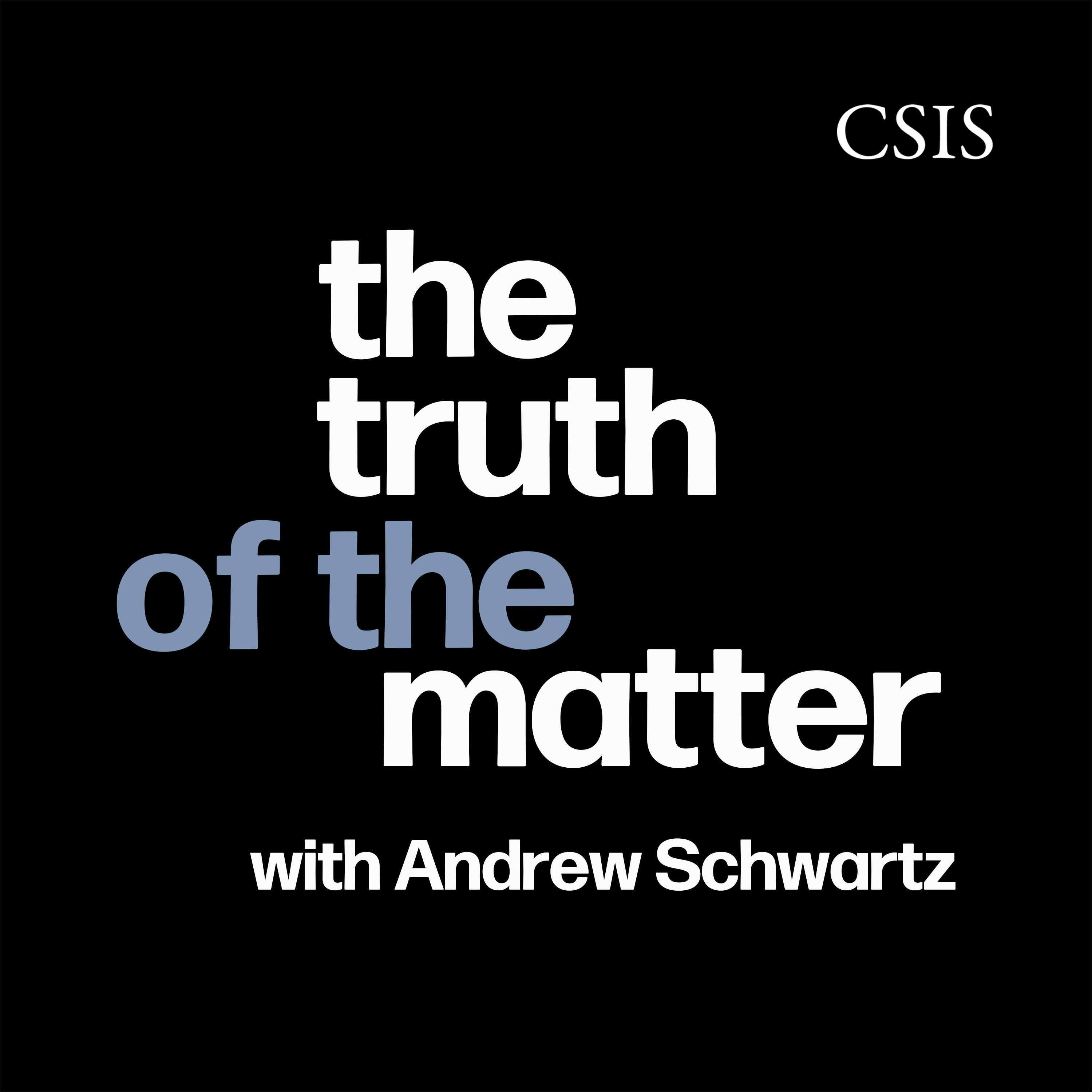

The Truth of the Matter
CSIS | Center for Strategic and International Studies
A weekly analysis of the complex policy issues driving the news.
Episodes
Mentioned books

Sep 15, 2021 • 22min
Era of Strategic Competition: Measuring Chinese and U.S. Engagement with African Security Chiefs
CSIS Africa Program director Judd Devermont joins the podcast to discuss his latest research findings that Beijing’s observable interactions with current and former African security chiefs pale in comparison to equivalent U.S. engagements, and, why this is so important for the United States in the era of strategic competition.

Sep 13, 2021 • 25min
Covid Reset
CSIS’s Dr. J. Stephen Morrison joins the podcast to discuss President Biden’s vaccine mandates, plans for a “Covid-19 reset” and the situation in Afghanistan with respect to Covid.

Sep 8, 2021 • 20min
Meet the New Taliban, Same as the Old Taliban
CSIS’s Dr. Seth Jones joins the podcast to discuss the Taliban announcement that this week they named Sirajuddin Haqqani —the Taliban’s deputy leader and close ally of al Qaeda—to be its first minister of interior. Haqqani, a U.S.-designated terrorist with close ties to the group responsible for 9/11 is now the Afghan equivalent of director of the Federal Bureau of Investigation.

Sep 2, 2021 • 31min
Digital Taliban
CSIS Human Rights Initiative Director Marti Flacks joins the podcast to discuss the new “digital Taliban,” and how it is poised to utilize biometric technology and electronic surveillance in order to rule Afghanistan. Plus, Ms. Flacks analyzes the initial signals the Taliban is sending on human rights and what, if any, leverage the United States has over the Taliban going forward.

Aug 26, 2021 • 28min
Global Jihadist Shot in the Arm
Former Undersecretary of Defense for Intelligence Mike Vickers joins the podcast along with CSIS’ Dr. Seth Jones to discuss the terrorist threat following the U.S. withdrawal of Afghanistan and what the United States should do about it.

Aug 24, 2021 • 27min
Afghan Addiction
CSIS SVP, Brzezinski Chair and Middle East Program Director Jon Alterman joins the podcast to talk about the new geopolitics surrounding Afghanistan in the aftermath of the U.S. withdrawal and what Iran, Russia, and China’s interests are with respect to Taliban rule.

Aug 19, 2021 • 30min
Jihadist Burning Man
The Wall Street Journal’s Alan Cullison left Kabul on Saturday, August 14 as the Taliban were poised to take control of the Afghan capital. He joins the podcast along with CSIS’s Dr. Seth Jones to discuss the latest developments as well as his recent experiences reporting on Al Qaeda and ISIS prisoners who have now been freed by the Taliban.

Aug 17, 2021 • 28min
Amy McGrath on Afghanistan and Her New Book “Honor Bound”
Former U.S. Senate candidate, U.S. Marine Lt. Col (Ret) fighter pilot Amy McGrath joins the podcast to talk about her time in Afghanistan, what she sees as the U.S. strategic interests in that region going forward, and about her new book, “Honor Bound: An American Story of Dreams and Service.”

Aug 16, 2021 • 24min
Afghanistan Now
CSIS’s Dr. Seth Jones joins the podcast to talk about the Taliban takeover of Afghanistan and what the U.S. should be prepared to do next.

May 13, 2021 • 32min
Violence and Coexistence in Israel with CSIS's Jon Alterman
Since Friday, violence has erupted throughout Israel and the Gaza Strip between Israelis and Palestinians, sparked by attempted evictions by Jewish settlers in an Arab neighborhood of Jerusalem and a skirmish between Israeli police and Palestinian mosque-goers at al Aqsa Mosque. Andrew is joined by CSIS senior vice president Jon Alterman, Brzezinski Chair in Global Security and Geostrategy, and director of the Middle East Program at CSIS, to discuss the causes of the recent conflict, from ineffective governance on each side, to the end of Israeli isolationism, to undue escalation by Hamas. Hamas, which as Alterman points out, "isn't a party to any of this," began launching rockets from the Gaza Strip and "injecting itself into Jerusalem's story," expanding the conflict from East Jerusalem to the whole country and into Gaza. According to Alterman, Israel may just consider this to be more of what they refer to as "mowing the grass," another in a series of opportunities to teach Hamas a lesson and put off finding a resolution to this ongoing conflict for a few more years. Either way, in Alterman’s analysis, finding a "partner for peace" will become increasingly more difficult as Israelis and Palestinians drift farther towards social extremes—despite the fact that "nobody is going away" and "their fates are intertwined."


